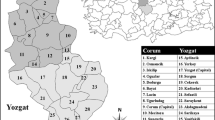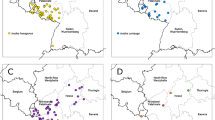Abstract
The ornithophilic tick species Ixodes frontalis (Panzer) is spatially distributed in Europe, Asia and northern Africa. It can serve as a carrier of different bacteria and viruses, but little is known of its actual vector competence. In addition, adult females of this species are associated with the avian “tick-related syndrome” (TRS). Like most ornithophilic tick species, I. frontalis is usually collected from bird nests or directly from their hosts. Reports of I. frontalis being collected with the flagging method are scarce. In Germany, the species is considered as very rare. In the few reports that are available, the majority of ticks has been discovered on migrating birds. Therefore, knowledge of the actual distribution of this species in Germany was strictly limited. In this study, we report the finding of 1084 individuals of I. frontalis collected with the flagging method in urban areas and gardens in several regions of Germany. Furthermore, the species was discovered on 35 dead Eurasian blackbirds (Turdus merula) from all over Germany. Finally, we report of five new possible cases of TRS, three in free-ranging birds and two in captive birds, including a Harris’s hawk (Parabuteo unicinctus) kept for falconry.


Similar content being viewed by others
References
Arthur DR (1963) British ticks. Butterworths, London
Bona M, Stanko M (2013) First records of the tick Ixodes frontalis (Panzer, 1795) (Acari, Ixodidae) in Slovakia. Ticks Tick-borne Dis 4:478–481. https://doi.org/10.1016/j.ttbdis.2013.06.002
Cadar D, Lühken R, van der Jeugd H, Garigliany M, Ziegler U, Keller M, Lahoreau J, Lachmann L, Becker N, Kik M, Oude Munnink BB, Bosch S, Tannich E, Linden A, Schmidt V, Koopmans MP, Rijks JM, Desmecht D, Groschup MH, Reusken C, Schmidt-Chanasit J (2017) Widespread activity of multiple lineages of Usutu virus, western Europe, 2016. Euro Surveill. https://doi.org/10.2807/1560-7917.es.2017.22.4.30452
Chastel C, Monnat JY, Le Lay G, Beaucournu JC (1981) Syndrome neurologique mortel chez une tourterelle turque (Streptopelia decaocto) et fixation de la tique (Ixodes pari (= I. frontalis). Ann Parasitol Hum Comp 56:349–351. https://doi.org/10.1051/parasite/1981563349
Chastel C, Guiguen C, Chastel O, Beaucournu JC (1991) Pouvoir pathogène, rôle vecteur et hôtes nouveaux d’Ixodes pari (= I. frontalis) (Acari; Ixodoidea; Ixodidae). Ann Parasitol Hum Comp 66:27–32. https://doi.org/10.1051/parasite/199166127
Doby JM (1998) Contribution to the knowledge of Ixodes (Trichotoixodes) pari Leach (= I. frontalis (Panzer)) (Acari: Ixodidae), a tick specific to birds. Acarologia 39:315–325
Filippova NA (1977) Ixodid ticks of the subfamily ixodinae. Nauka Publ. House, Saint Petersburg
Franz D (2010) Zeckenbefall bei Halsbandsittichen. Papageien 3:98–99
Gilot B, Beaucournu JC, Chastel C (1997) Collecte « au drapeau » et fixation sur l’homme d’Ixodes (Trichotoixodes) frontalis (Panzer, 1795). Parasite 4:197–199. https://doi.org/10.1051/parasite/1997042197
Guo Y, Sun Y, Xu R (2016) The genus Ixodes (Acari: Ixodidae) in China with three new record species. Acta Parasitol 61:729–742. https://doi.org/10.1515/ap-2016-0102
Heylen DJA, de Coninck E, Jansen F, Madder M (2014a) Differential diagnosis of three common Ixodes spp. ticks infesting songbirds of Western Europe: Ixodes arboricola, I. frontalis and I. ricinus. Ticks Tick-borne Dis 5:693–700. https://doi.org/10.1016/j.ttbdis.2014.05.006
Heylen DJA, Sprong H, van Oers K, Fonville M, Leirs H, Matthysen E (2014b) Are the specialized bird ticks, Ixodes arboricola and I. frontalis, competent vectors for Borrelia burgdorferi sensu lato? Environ Microbiol 16:1081–1089. https://doi.org/10.1111/1462-2920.12332
Heylen DJA, Fonville M, van Leeuwen AD, Stroo A, Duisterwinkel M, van Wieren SE, Diuk-Wasser M, Bruin Ad, Sprong H (2017a) Pathogen communities of songbird-derived ticks in Europe’s low countries. Parasites Vectors 10:497. https://doi.org/10.1186/s13071-017-2423-y
Heylen DJA, Krawczyk A, Carvalho ILd, Núncio MS, Sprong H, Norte AC (2017b) Bridging of cryptic Borrelia cycles in European songbirds. Environ Microbiol 19:1857–1867. https://doi.org/10.1111/1462-2920.13685
Hillyard P (1996) Ticks of north-west Europe: Keys and notes for identification of the species. Synopses of the British fauna, N.S., 52. Field Studies Council, Shrewsbury
Hoogstraal H, Kaiser MN, Traylor MA, Guindy E, Gaber S (1963) Ticks (Ixodidae) on birds migrating from Europe and Asia to Africa 1959-61. Bull World Health Organ 28:235–262
Kaiser MN, Hoogstraal H, Watson GE (1974) Ticks (Ixodoidea) on migrating birds in Cyprus, fall 1967 and spring 1968, and epidemiological considerations. BER 64:97. https://doi.org/10.1017/S0007485300027024
Kar S, Yılmazer N, Akyıldız G, Gargılı A (2017) The human infesting ticks in the city of Istanbul and its vicinity with reference to a new species for Turkey. Syst Appl Acarol 22:2245–2255. https://doi.org/10.11158/saa.22.12.14
Keskin A, Erciyas-Yavuz K (2016) A preliminary investigation on ticks (Acari: Ixodidae) infesting birds in Kızılırmak Delta, Turkey. J Med Entomol 53:217–220. https://doi.org/10.1093/jme/tjv149
Literak I, Norte AC, Núncio MS, Carvalho ILd, Ogrzewalska M, Nováková M, Martins TF, Sychra O, Resendes R, Rodrígues P (2015) Ticks on passerines from the Archipelago of the Azores as hosts of borreliae and rickettsiae. Ticks Tick-borne Dis 6:607–610. https://doi.org/10.1016/j.ttbdis.2015.05.003
Lundqvist L, Gray JS, Hillyard P (1998) Ixodes frontalis on the Baltic island of Gotland, Sweden. Med Vet Entomol 12:215–216. https://doi.org/10.1046/j.1365-2915.1998.00101.x
Mangold AJ, Bargues MD, Mas-Coma S (1998) Mitochondrial 16S rDNA sequences and phylogenetic relationships of species of Rhipicephalus and other tick genera among Metastriata (Acari: Ixodidae). Parasitol Res 84:478–484
Manilla G (1998) Acari: Ixodida, 1st edn. Fauna d’Italia, Calderini
Mehl R (1983) The distribution and host relations of Norwegian ticks (Acari, Ixodides). Fauna Norvegica Series B 31:46–58
Michel F, Fischer D, Eiden M, Fast C, Reuschel M, Müller K, Rinder M, Urbaniak S, Brandes F, Schwehn R, Lühken R, Groschup MH, Ziegler U (2018) West Nile virus and usutu virus monitoring of wild birds in Germany. Int J Environ Res Public Health 15:171. https://doi.org/10.3390/ijerph15010171
Monks D, Fisher M, Forbes NA (2006) Ixodes frontalis and avian tick-related syndrome in the United Kingdom. J Small Anim Pract 47:451–455. https://doi.org/10.1111/j.1748-5827.2006.00031.x
Morozov AC, Tischenkov AA, Proka AA, Silaghi C, Toderas IK, Movila A, Poppert S (2014) Prevalence of tick-borne pathogens in ticks from migratory birds in republic of Moldova. Parasites Vectors 7:P4. https://doi.org/10.1186/1756-3305-7-S1-P4
Movila A, Alekseev AN, Dubinina HV, Toderas IK (2013) Detection of tick-borne pathogens in ticks from migratory birds in the Baltic region of Russia. Med Vet Entomol 27:113–117. https://doi.org/10.1111/j.1365-2915.2012.01037.x
Norte AC, Carvalho ILd, Ramos JA, Gonçalves M, Gern L, Núncio MS (2012) Diversity and seasonal patterns of ticks parasitizing wild birds in western Portugal. Exp Appl Acarol 58:327–339. https://doi.org/10.1007/s10493-012-9583-4
Obsomer V, Wirtgen M, Linden A, Claerebout E, Heyman P, Heylen DJA, Madder M, Maris J, Lebrun M, Tack W, Lempereur L, Hance T, van Impe G (2013) Spatial disaggregation of tick occurrence and ecology at a local scale as a preliminary step for spatial surveillance of tick-borne diseases: general framework and health implications in Belgium. Parasites Vectors 6:190. https://doi.org/10.1186/1756-3305-6-190
Palomar AM, Santibáñez P, Mazuelas D, Roncero L, Santibáñez S, Portillo A, Oteo JA (2012) Role of birds in dispersal of etiologic agents of tick-borne zoonoses, Spain, 2009. Emerg Infect Dis 18:1188–1191. https://doi.org/10.3201/eid1807.111777
Pietzsch ME, Mitchell R, Jameson LJ, Morgan C, Medlock JM, Collins D, Chamberlain JC, Gould EA, Hewson R, Taylor MA, Leach S (2008) Preliminary evaluation of exotic tick species and exotic pathogens imported on migratory birds into the British Isles. Vet Parasitol 155:328–332. https://doi.org/10.1016/j.vetpar.2008.05.006
Poupon M-A, Lommano E, Humair P-F, Douet V, Rais O, Schaad M, Jenni L, Gern L (2006) Prevalence of Borrelia burgdorferi Sensu Lato in Ticks Collected from Migratory Birds in Switzerland. Appl Environ Microbiol 72:976–979. https://doi.org/10.1128/AEM.72.1.976-979.2006
Putzig P (1939) Rauchschwalben-Sterben durch Zecken (Ixodidae) verursacht. Der Vogelzug 10:25–27
Santos-Silva MM, Sousa R, Santos AS, Melo P, Encarnação V, Bacellar F (2006) Ticks parasitizing wild birds in Portugal: detection of Rickettsia aeschlimannii, R. helvetica and R. massiliae. Exp Appl Acarol 39:331. https://doi.org/10.1007/s10493-006-9008-3
Schorn S, Schöl H, Pfister K, Silaghi C (2011) First record of Ixodes frontalis collected by flagging in Germany. Ticks Tick-borne Dis 2:228–230. https://doi.org/10.1016/j.ttbdis.2011.07.003
Siuda K (1991) Kleszcze (Acari: Ixodida) Polski.: Cz. 1, Zagadnienia ogólne. Wydaw. Naukowe PWN, Warsaw
Tsapko NV, Kotti BK (2017) The Tick Ixodes frontalis (Acari, Ixodidae) in the North Caucasus. Parazitologiya 50:253–260
Walter G, Liebisch A, Vauk G (1979) Untersuchungen zur Biologie und Verbreitung von Zecken (Ixodoidea, Ixodidae) in Norddeutschland. II. Zecken der Zugvogel auf der Insel Helgoland. Zeitschrift fur angewandte Zoologie 66:445–462
Walter G, Kock D, Liebisch A (1986) Contribution to the tick fauna of West Germany (Arachnida:Acarina:Ixodidae). Senckenbergiana Biol 67:199–206
Wilson N (1970) New distributional records of ticks from Southeast Asia and the Pacific (Metastigmata: Argasidae, Ixodidae). Oriental Insects 4:37–46. https://doi.org/10.1080/00305316.1970.10433939
Acknowledgements
This study was partially supported financially by Pfizer Pharma GmbH, Baxter Deutschland GmbH and Ixoguard B.V. The authors thank the volunteers of the Society to Support Avian Medicine in Giessen (Verein zur Förderung der Vogelmedizin in Giessen e.V.) and Sylvia Urbaniack from Birds of Prey Rehab Center Rhineland (Greifvogelhilfe Rheinland, Brueggen, Germany) for taking care of the free-ranging birds after medical treatment until release back into the wild. Additional thank goes to Almuth Eberius for informing us about an infested bird. We also thank all garden owners who collected ticks with the flagging method and those citizens helping with the collection of birds.
Author information
Authors and Affiliations
Corresponding author
Ethics declarations
Conflict of interest
Parts of this study (the collection of ticks on vegetation in Baden-Wuerttemberg) were supported financially by Pfizer Pharma GmbH, Baxter Deutschland GmbH and Ixoguard B.V.
Additional information
Publisher's Note
Springer Nature remains neutral with regard to jurisdictional claims in published maps and institutional affiliations.
Electronic supplementary material
Below is the link to the electronic supplementary material.
Rights and permissions
About this article
Cite this article
Drehmann, M., Chitimia-Dobler, L., Lindau, A. et al. Ixodes frontalis: a neglected but ubiquitous tick species in Germany. Exp Appl Acarol 78, 79–91 (2019). https://doi.org/10.1007/s10493-019-00375-3
Received:
Accepted:
Published:
Issue Date:
DOI: https://doi.org/10.1007/s10493-019-00375-3




